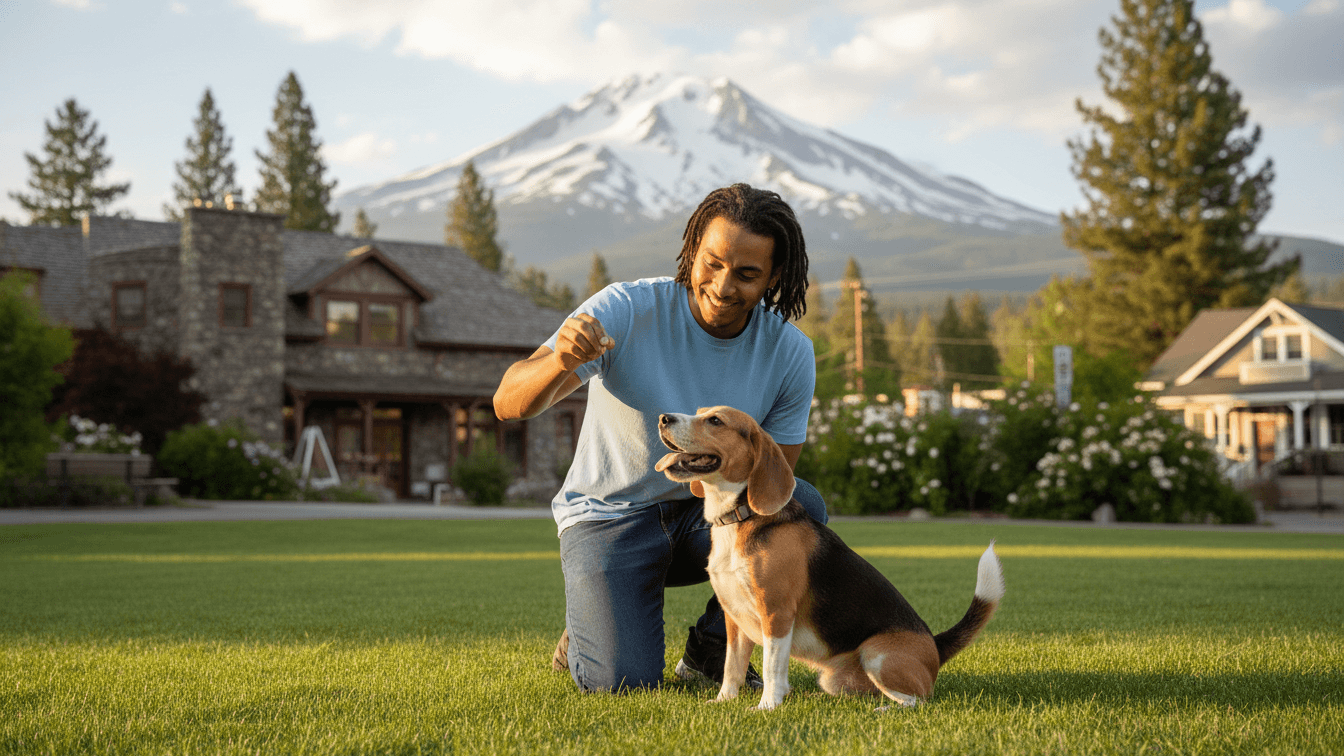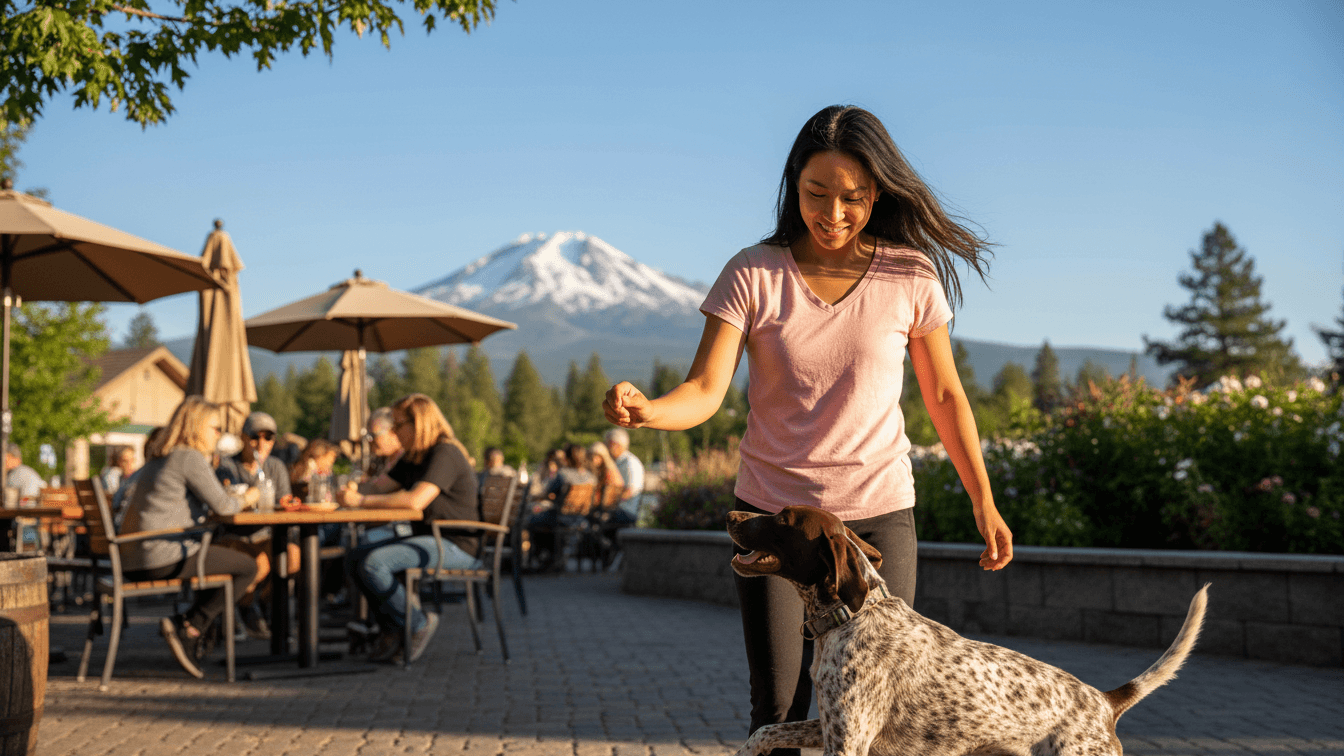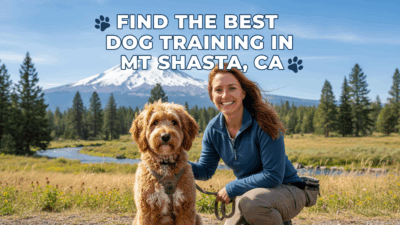Your Complete Guide to Choosing a Dog Trainer in Mt Shasta and Surrounding Areas
Living with a dog in Mt Shasta means navigating narrow sidewalks in the historic downtown, hiking trails near the base of the mountain, and helping your dog stay calm around wildlife encounters. Your dog needs to handle everything from crowded summer tourist events to polite interactions at local shops that welcome pets along Mt Shasta Boulevard.
Mt Shasta sits in Siskiyou County, where rural living brings unique challenges like off-leash livestock, deer crossings, and long stretches without sidewalks. When you find a trainer who understands these mountain town realities, you’ll get better results both at home and out in your community.
How to Choose the Right Trainer
Start by looking for someone who uses positive reinforcement training and can set realistic goals for your Mt Shasta lifestyle. This means your dog should learn to walk calmly past grazing horses, stay focused near wildlife on trails, and handle long car rides to veterinary appointments in larger towns.
Credentials give you a quick way to compare trainers’ experience levels. Common dog trainer certifications include KPA-CTP, CPDT-KA, or IAABC-CDBC for behavior problems. If your dog has serious aggression issues or intense reactivity toward wildlife, look for someone with CBCC-KA or a science-based program.
In-home dog training works great for puppy manners, door greetings, and skills specific to mountain living like settling calmly after hiking. Group classes make sense once your dog can focus around other dogs, especially before you try busier spots during peak tourist season.
Common Dog Training Methods Explained

Reward-based methods build the trust you want while creating lasting behavior changes. They also help you follow Siskiyou County’s rules about keeping dogs under control in public areas.
Basic obedience covers sit, down, stay, place, recall, and leash training so your dog can handle downtown walks, outdoor dining areas, and trailhead parking lots without pulling or jumping on hikers. These foundational skills become especially important in a small community where you’ll see the same neighbors and business owners regularly.
Puppy training focuses on socialization, potty training, bite control, crate comfort, and early leash manners. Starting with short, positive training sessions prevents bad habits from forming and helps puppies adjust to mountain town sounds like logging trucks and snowplows.
Behavior modification addresses fear, reactivity, resource guarding, or separation anxiety through careful desensitization and counterconditioning. For serious cases, ask if your trainer works with local veterinarians or can refer you to specialists in larger nearby cities.
Private lessons and in-home sessions let you customize everything around your daily routines and specific property challenges. Day training can speed up results when you’re juggling work and want a professional dog trainer to handle the repetitions.
Group classes help your dog practice good manners around other dogs and people. The best dog training classes give dogs plenty of space, screen participants carefully, and teach calm behavior rather than just excitement.
Specialized training like therapy dog training or service dog training requires extra structure, public-access skills, and a very clear step-by-step training program. These programs demand consistency that goes beyond typical obedience training.
Stay away from trainers who use fear, intimidation, or pain to get results. Humane methods are safer for everyone, easier to maintain long-term, and much better for keeping your dog confident around new experiences in this outdoor-focused community.
Average Cost of Dog Training in Mt Shasta and Surrounding Areas (Updated for 2025)
Prices around Mt Shasta and Siskiyou County depend on the trainer’s experience, how long sessions last, and whether they travel from larger towns. Here’s what most local pet owners are paying in 2025.
| Service Type | Average Cost (Mt Shasta/Siskiyou County) |
|---|---|
| Puppy classes (4-6 weeks) | $175-$300 total |
| Group obedience classes (4-6 weeks) | $180-$325 total |
| Private lessons (60-90 min) | $120-$200 per session |
| In-home coaching packages (4-6 visits) | $475-$1,000 total |
| Day training (trainer works your dog + handoff) | $500-$1,100 per week |
| Behavior consult for reactivity/anxiety (initial) | $175-$275 |
| Board and train (2-4 weeks) | $2,200-$5,000 total |
You’ll probably pay extra travel fees if your trainer comes from Redding or other surrounding areas, and expect higher rates for complex behavior work like aggressive dog training. Rural locations often mean trainers charge mileage for distance.
Make sure you understand what’s included, how the trainer tracks progress, and whether they offer a free consultation before you commit to a training program.
Questions to Ask a Potential Dog Trainer
- What training methods do you use, and how do you keep training sessions positive and low-stress?
- What credentials do you have, and do you keep up with continuing education such as CPDT-KSA?
- How will you customize the dog training services for my dog’s specific needs and our mountain town lifestyle?
- Do you offer in-home visits, group classes, or day training, and which approach fits my goals best?
- Have you worked with dogs who need training around wildlife, livestock, or other rural challenges common to Mt Shasta?
- How will we measure my dog’s progress and know when to add more distractions?
- What are the total costs, including any travel fees, and what’s your cancellation policy?
- Do you carry liability insurance, and can you show me proof?
- For behavior problems, will you work with my veterinarian if needed?
- What should I practice between our sessions to help your dog keep improving?
Local Mt Shasta Rules and Considerations
Mt Shasta enforces leash laws and animal control rules to keep parks and neighborhoods safe for everyone. Siskiyou County follows California’s public health requirements too.
Leashes are required throughout most of Mt Shasta’s public spaces, including downtown sidewalks, city parks, and trailheads within city limits. Keep a standard 6-foot leash with you whenever you leave your property.
California law requires current rabies vaccination for all dogs over four months old, and you’ll need proof of vaccination if your dog bites someone or gets reported for running at large. You can get these through local vets or county clinics.
Mt Shasta’s noise ordinance covers excessive barking, so work with your trainer on alert barking and separation anxiety before neighbors file complaints with the police department. This becomes especially important in close-knit neighborhoods where sound travels.
California doesn’t require special licenses for professional dog trainers, but if a business boards dogs for payment as part of board and train programs, they may need permits and inspections. Trainers should carry liability insurance if they’re conducting business on public property.
Siskiyou County Animal Control handles lost pets, bite reports, and licensing questions at their facility in Yreka. You can reach them through the county’s main website for resources regarding found animals and county regulations.
Local Mt Shasta Resources for Dog Owners
These spots give you great places to practice polite manners, work on recalls, and provide safe enrichment for training for dogs. Always follow the posted rules and respect other users.
- Mt Shasta City Park offers open grassy areas where you can practice leash skills and basic commands on quieter mornings before crowds arrive, though dogs must remain leashed at all times.
- Siskiyou Lake provides lakeside trails where leashed dogs can practice focus around ducks, picnickers, and other distractions while enjoying scenic walking paths.
- Black Butte Trail welcomes leashed dogs and offers excellent opportunities to work on trail manners, passing hikers politely, and building your dog’s stamina in a controlled outdoor setting.
For off-leash dog park options, you’ll need to travel to nearby communities or check with local businesses that may offer private enclosed areas by appointment.

FAQs
How much does in-home dog training cost?
Most trainers serving Mt Shasta charge $120-$200 per in-home visit, with discounts available when you buy packages of four to six sessions. Behavior problems and aggressive dog training typically start at the higher end of that range.
Is in-home dog training worth it?
Absolutely, because you’re working on problems exactly where they happen. Your trainer can fix door manners, jumping on guests, counter-surfing, and fence reactivity right at home, then step outside to practice leash skills on your actual neighborhood roads and trails.
Can you pay someone to house train your dog?
Yes, many trainers offer puppy training programs that include potty training, crate routines, and daily schedules. Day training can speed up the process while teaching you how to maintain the progress once your puppy goes home each evening.
What is the 3-3-3 rule for dog training?
This is a helpful timeline for new or adopted dogs: expect about 3 days for your dog to decompress, 3 weeks to learn your routines, and 3 months to feel completely settled. Good training programs work with this natural adjustment period rather than rushing results.
How long will it take to reach my training goals?
Most puppies and friendly adult dogs show solid progress within 4-8 weeks if you practice daily between training sessions. Fear, reactivity toward wildlife, or aggression typically requires several months of careful behavior modification with gradual increases in difficulty.
What should I bring to group classes?
Pack a flat collar or harness, a 6-foot leash, high-value treats, water, and current vaccination records if your trainer requests them. Leave retractable leashes at home for safety reasons, especially in smaller training spaces.
What’s the leash law in Mt Shasta?
Dogs must be leashed and under control in all public areas within city limits. This includes downtown sidewalks, city parks, and most trailheads. Violations can result in citations from Mt Shasta Police Department or Siskiyou County Animal Control.
Do I need a dog license in Mt Shasta or Siskiyou County?
Siskiyou County requires dog licenses for all dogs over four months old. You’ll need proof of current rabies vaccination to get a license, which you can obtain through the County Clerk’s office or online through the county website. Licensed dogs receive reduced impound fees if they’re ever picked up by animal control.
What shots does my dog need in Siskiyou County or California?
Rabies vaccination is required throughout California for all dogs over four months old. Your veterinarian may also recommend distemper-parvo, leptospirosis due to wildlife exposure, and bordetella based on your dog’s lifestyle and socialization needs.
Are dog trainers required to be licensed in Mt Shasta or Siskiyou County or California?
No special trainer licenses exist in California. Expert dog trainers follow normal business regulations, but if they offer board and train services where dogs stay overnight, their facility may need to meet kennel licensing requirements through local animal control or the California Department of Food and Agriculture.
Where can I practice off-leash recall?
Mt Shasta doesn’t have a dedicated fenced dog park, so your safest options are private property with permission, securely fenced yards, or traveling to nearby communities with enclosed dog parks. Some trainers may offer private training spaces where you can practice recall safely.
Which dog parks allow training around Mt Shasta?
Mt Shasta currently doesn’t have a public dog park within city limits. For fenced off-leash areas, you’ll need to travel to communities like Redding, about an hour south, which offers several options for practicing recalls and socialization in a controlled environment.
What beaches or trails allow dogs for training?
Lake Siskiyou Beach allows leashed dogs and provides excellent opportunities for water introduction, distraction training around swimmers and kayakers, and practicing calm behavior near busy recreational areas. Most trails in the Shasta-Trinity National Forest surrounding Mt Shasta welcome leashed dogs, making them perfect for building trail manners and working on focus around wildlife and other hikers. Always check current forest service regulations before heading out, as some wilderness areas have seasonal restrictions.
How do I find a certified dog trainer in Mt Shasta?
Look for trainers with credentials like CTC or other recognized certifications who serve the Mt Shasta area. Many certified trainers travel from larger communities to provide dog obedience training in rural areas, so asking about their service radius and travel policies helps set clear expectations.
What if my dog is reactive to wildlife?
Reactivity toward deer, squirrels, and other wildlife is extremely common in Mt Shasta given the abundant animal populations. A qualified trainer can help your dog through behavior modification protocols that teach calm focus even when prey animals are visible. This work takes time and consistency but makes hiking and walking much more enjoyable for everyone.
The right combination of thoughtful planning, humane methods, and consistent practice around Mt Shasta’s trails and neighborhoods will help your dog become a confident, well-behaved dog. Whether you’re working on basic commands for a new puppy or addressing serious behavior challenges, finding the right professional support makes all the difference in this unique mountain community. If credentials matter to you, don’t hesitate to ask about dog trainer certifications and request a free evaluation to see if a trainer’s style matches your goals.
